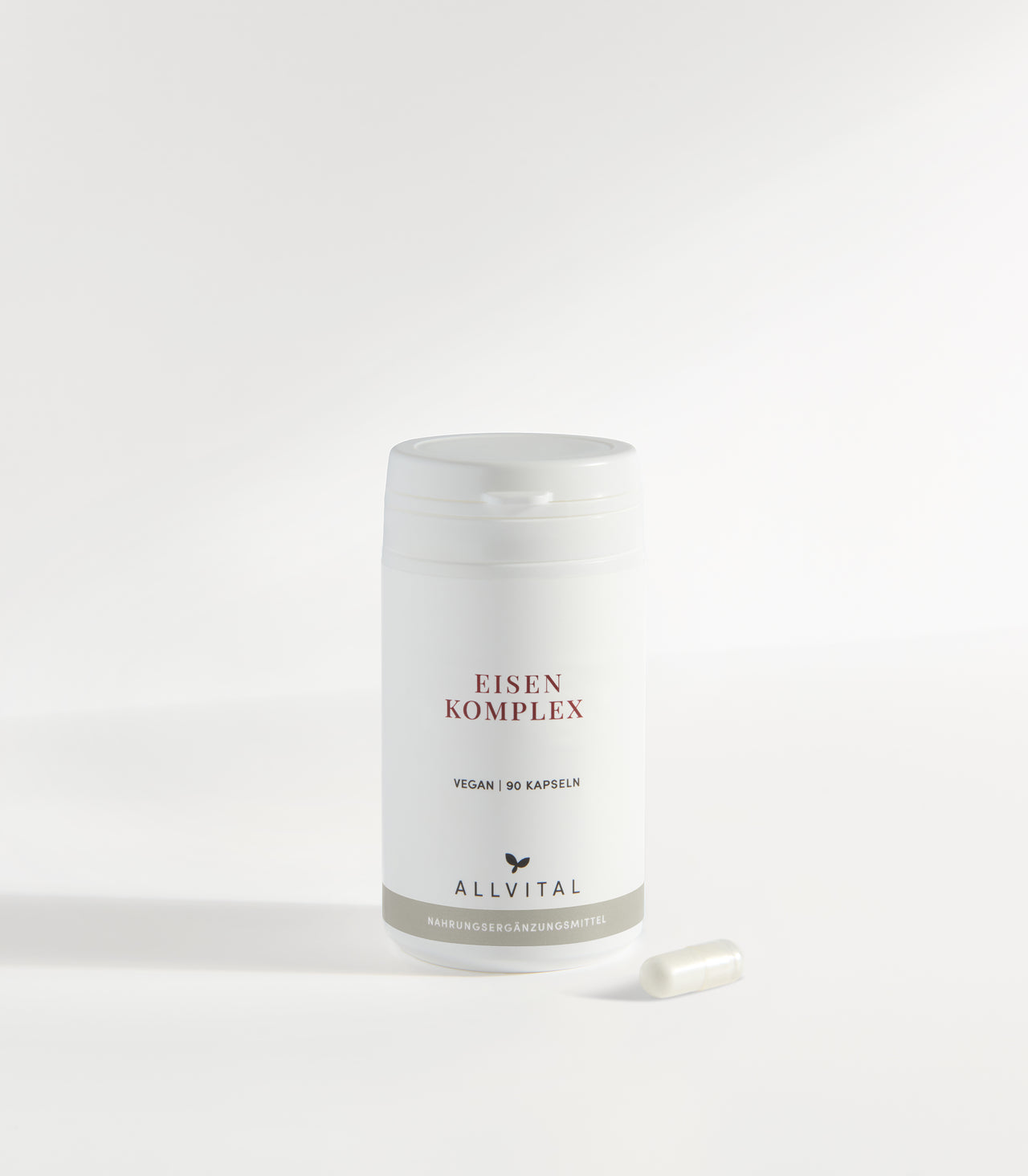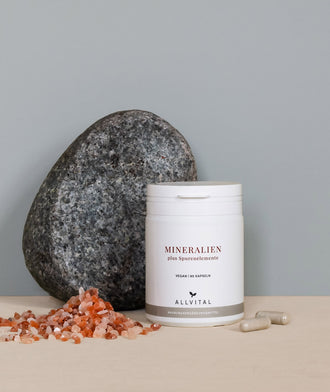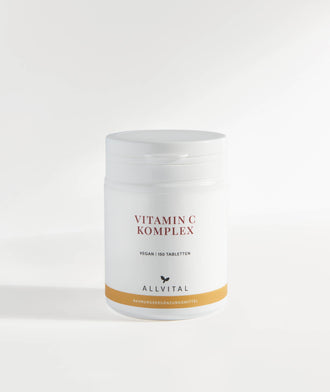
Product Introduction: Iron Complex
A good supply of iron is essential for our health. Our new complex supplement supports iron metabolism and blood formation on multiple levels.
Iron deficiency is widespread
The trace element iron has numerous functions in the human body. It is particularly well known in connection with haematopoiesis and the oxygen supply to the entire organism. Iron is also important for immune defence and cognitive function, among other things.
Despite the great importance of iron for our health, iron deficiency is one of the most common deficiency symptoms worldwide. Women of childbearing age in particular are often affected by an undersupply of the trace element. Taking iron supplements can compensate for this deficiency and is therefore useful for many people.
Our new Iron Complex preparation has been developed for this purpose and, in addition to iron, contains other vital substances that support iron metabolism.
The role of iron in the body
Iron is a key component of hemoglobin, the protein in red blood cells responsible for oxygen transport from the lungs to the body’s cells. When iron levels are low, the entire body receives less oxygen.
Other key functions of iron include:
- Supporting energy metabolism
- Maintaining cognitive performance
- Forming red blood cells
- Strengthening the immune system
- Aiding in cell division
Symptoms of iron deficiency
If our body lacks iron, our cells are less well supplied with oxygen. This can result in chronic tiredness and exhaustion and ultimately reduced physical and mental performance.
Other possible symptoms include paleness, shortness of breath, increased chills and headaches. Hair loss can also be associated with iron deficiency.
How to diagnose iron deficiency
Iron deficiency can be diagnosed through blood tests. Important markers include ferritin levels, red blood cell indices (MCV, MCHC, MCH), hemoglobin levels, and transferrin saturation.
Causes of iron deficiency
The most common cause is inadequate dietary intake of bioavailable iron. Other factors include:
- Blood loss due to heavy menstrual bleeding or also due to injuries, operations
- Frequent consumption of foods that interfere with iron absorption in the intestine (e.g. green tea, black tea, coffee)
- Increased requirement during rapid physical growth and during pregnancy
- Chronic inflammatory bowel diseases that disrupt the absorption of iron and lead to a loss of the trace element via the intestine
New product: Iron Complex by Allvital
Our new product Iron Complex is a combination preparation that combines iron with other micronutrients and thus effectively supports iron metabolism and haematopoiesis in various ways and can compensate for an iron deficiency.
The micronutrients contained in addition to iron promote, for example, the absorption of iron in the intestine, are involved in iron transport in the body or play a role in haematopoiesis. This also explains why Iron Complex is more effective than preparations containing iron in isolation.
What are the different forms of iron?
If you compare different iron supplements, you will find different names, including ferrous sulphate, ferric chloride or ferrous fumarate.
When developing our product, we decided to use ferrous bisglycinate. In this compound, iron is bound to the natural amino acid glycine. This substance is characterised by its high bioavailability. The iron it contains can be efficiently absorbed by the intestine and utilised by the body. This means that the dosage can be lower than with other iron compounds.
Furthermore, iron bisglycinate is well tolerated when taken and only leads to gastrointestinal complaints in rare cases and at higher dosages. In studies, preparations with other iron compounds have more frequently led to gastrointestinal side effects in test subjects than preparations with bisglycinate.
Incidentally, iron bisglycinate is a vegan compound and is therefore also suitable for the vegetarians and vegans among you.
Other ingredients in Iron Complex
In addition to iron, our formula contains these vital nutrients:
- Vitamin C: Vitamin C promotes the absorption of iron in the intestine. Vitamin C also strengthens our immune system and is necessary for the formation of connective tissue.
- Vitamin A: Vitamin A is important for a healthy iron metabolism. This vitamin is particularly well known for its importance for the health of the eyes, skin and mucous membranes.
- Copper: The trace element copper supports iron transport in the body. Copper is also known for its role in the pigmentation of skin and hair.
- Molybdenum: The trace element molybdenum is a cofactor of various enzymes. One of these enzymes is involved in iron metabolism.
How much iron do we need daily?
The German Nutrition Society (DGE) recommends a daily intake of 11 mg iron for men. For adult women with a menstrual cycle, 16 mg per day is recommended, for women after the menopause 14 mg and for pregnant women 27 mg (1).
You can only find out for sure whether your iron requirement is covered by having a blood test. Depending on your state of health and lifestyle, your requirement may also deviate from the above information.
Iron needs during pregnancy
As pregnancy progresses, the need for iron increases significantly as the pregnant woman's blood volume increases so that the growing child is well supplied with oxygen and nutrients. Pregnant women should therefore pay particular attention to their iron supply.
Foods high in iron
Iron is found in plant and animal foods. Contrary to what one might expect, the content of the trace element in animal products is not necessarily higher than in plant products.
However, humans can absorb iron from animal foods, so-called haem iron, better than iron from fruit and vegetables. Plant iron is usually firmly bound and in trivalent form (Fe3+). Haem iron, on the other hand, is chemically bivalent (Fe2+) and can be easily absorbed in the intestine.
In order for the body to absorb the trace element from plant sources well, it must be converted into a soluble form and transformed into divalent iron (Fe2+). Acids such as vitamin C (ascorbic acid) can perform this conversion step. Vitamin C therefore improves iron absorption.
Some examples of iron-rich foods are listed below. The content refers to 100 g of food (2):
- Wheat bran: 16 mg
- Black pudding: 11 mg
- Linseed (cooked): 6 mg
- Pumpkin seed: 5 mg
- Parsley (fresh): 4 mg
- Beef (cooked): 3 mg
- Spinach (cooked): 3 mg
- Lentils (cooked): 2 mg
Why take iron supplements?
If you suffer from an iron deficiency, you should at least supplement iron as a cure and have your levels checked after taking it for a few months (e.g. 4 months).
The content of the trace element in food can vary greatly. Growing conditions or preparation, for example, play an important role here. So even if you plan your diet carefully, you cannot be sure that you are really taking in enough iron to compensate for the deficiency.
Taking a dietary supplement such as Iron Complex is a simple way of ensuring that you are well supplied.
How to take Iron Complex
To cover the iron requirement, we recommend taking 1 capsule per day. Iron Complex can be taken both with meals and independently of meals at any time of day.
When taking it, a time interval of at least one hour should be maintained between it and foods such as green and black tea, coffee and red wine, as these interfere with the absorption of iron. Calcium-rich foods or food supplements also interfere with intestinal absorption.
Foods with vitamin C (e.g. fruit, vegetables), fruit acids (e.g. fruit), lactic acid (e.g. sauerkraut, fermented foods) and vitamin A (e.g. carrots), on the other hand, improve absorption.
Are there any side effects from taking iron?
With iron salts such as ferrous sulphate or ferric chloride, side effects such as nausea, vomiting, diarrhoea, constipation and a darkening of the stools can occur. This hardly plays a role with the ferrous bisglycinate used in Iron Complex, especially not in the recommended dosage. If you have a sensitive stomach, we recommend taking it with a meal.
It is important to take iron in accordance with the recommended dosage on the packaging or the doctor's instructions. An overdose of iron can lead to the increased formation of free radicals, which should of course be avoided.
Why choose Iron Complex from Allvital?
Here’s why our new product stands out:
- Doctor-developed formula to support blood formation and iron metabolism
- Effective dosage
- Ingredients that complement each other for optimal results
- Free from preservatives, colorants, and flavor enhancers
- Vegan, gluten-free, sugar-free, and GMO-free
- Manufactured in the EU under strict quality standards
Would you like to benefit from all these advantages? Then simply order your iron complex today via your customer account or by phone.
Note: Dietary supplements should be taken in consultation with an experienced doctor or therapist to ensure that the correct dosage is taken and that there are no interactions with other medications.
Sources
- Eisen. Deutsche Gesellschaft für Ernährung e. V. [Internet]. [aufgerufen am: 09.09.2024].
- Deutsches Ernährungsberatungs- und -informationsnetz [Internet]. [aufgerufen am: 09.09.2024].



